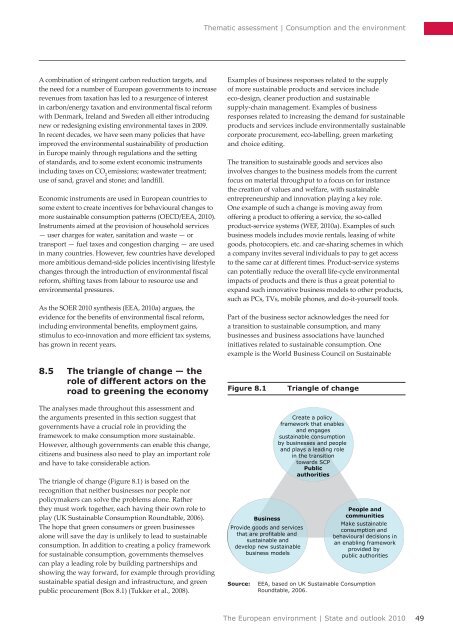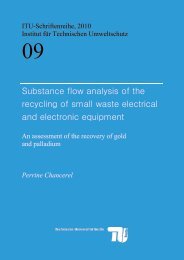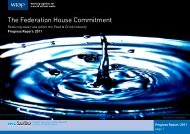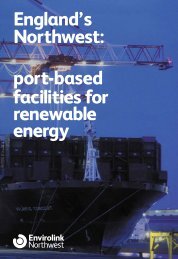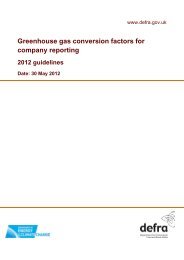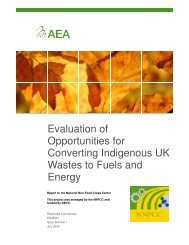Consumption and the environment (SOER2010) - European ...
Consumption and the environment (SOER2010) - European ...
Consumption and the environment (SOER2010) - European ...
You also want an ePaper? Increase the reach of your titles
YUMPU automatically turns print PDFs into web optimized ePapers that Google loves.
Thematic assessment | <strong>Consumption</strong> <strong>and</strong> <strong>the</strong> <strong>environment</strong><br />
A combination of stringent carbon reduction targets, <strong>and</strong><br />
<strong>the</strong> need for a number of <strong>European</strong> governments to increase<br />
revenues from taxation has led to a resurgence of interest<br />
in carbon/energy taxation <strong>and</strong> <strong>environment</strong>al fiscal reform<br />
with Denmark, Irel<strong>and</strong> <strong>and</strong> Sweden all ei<strong>the</strong>r introducing<br />
new or redesigning existing <strong>environment</strong>al taxes in 2009.<br />
In recent decades, we have seen many policies that have<br />
improved <strong>the</strong> <strong>environment</strong>al sustainability of production<br />
in Europe mainly through regulations <strong>and</strong> <strong>the</strong> setting<br />
of st<strong>and</strong>ards, <strong>and</strong> to some extent economic instruments<br />
including taxes on CO 2<br />
emissions; wastewater treatment;<br />
use of s<strong>and</strong>, gravel <strong>and</strong> stone; <strong>and</strong> l<strong>and</strong>fill.<br />
Economic instruments are used in <strong>European</strong> countries to<br />
some extent to create incentives for behavioural changes to<br />
more sustainable consumption patterns (OECD/EEA, 2010).<br />
Instruments aimed at <strong>the</strong> provision of household services<br />
— user charges for water, sanitation <strong>and</strong> waste — or<br />
transport — fuel taxes <strong>and</strong> congestion charging — are used<br />
in many countries. However, few countries have developed<br />
more ambitious dem<strong>and</strong>‐side policies incentivising lifestyle<br />
changes through <strong>the</strong> introduction of <strong>environment</strong>al fiscal<br />
reform, shifting taxes from labour to resource use <strong>and</strong><br />
<strong>environment</strong>al pressures.<br />
As <strong>the</strong> SOER 2010 syn<strong>the</strong>sis (EEA, 2010a) argues, <strong>the</strong><br />
evidence for <strong>the</strong> benefits of <strong>environment</strong>al fiscal reform,<br />
including <strong>environment</strong>al benefits, employment gains,<br />
stimulus to eco‐innovation <strong>and</strong> more efficient tax systems,<br />
has grown in recent years.<br />
Examples of business responses related to <strong>the</strong> supply<br />
of more sustainable products <strong>and</strong> services include<br />
eco‐design, cleaner production <strong>and</strong> sustainable<br />
supply‐chain management. Examples of business<br />
responses related to increasing <strong>the</strong> dem<strong>and</strong> for sustainable<br />
products <strong>and</strong> services include <strong>environment</strong>ally sustainable<br />
corporate procurement, eco‐labelling, green marketing<br />
<strong>and</strong> choice editing.<br />
The transition to sustainable goods <strong>and</strong> services also<br />
involves changes to <strong>the</strong> business models from <strong>the</strong> current<br />
focus on material throughput to a focus on for instance<br />
<strong>the</strong> creation of values <strong>and</strong> welfare, with sustainable<br />
entrepreneurship <strong>and</strong> innovation playing a key role.<br />
One example of such a change is moving away from<br />
offering a product to offering a service, <strong>the</strong> so‐called<br />
product‐service systems (WEF, 2010a). Examples of such<br />
business models includes movie rentals, leasing of white<br />
goods, photocopiers, etc. <strong>and</strong> car‐sharing schemes in which<br />
a company invites several individuals to pay to get access<br />
to <strong>the</strong> same car at different times. Product‐service systems<br />
can potentially reduce <strong>the</strong> overall life‐cycle <strong>environment</strong>al<br />
impacts of products <strong>and</strong> <strong>the</strong>re is thus a great potential to<br />
exp<strong>and</strong> such innovative business models to o<strong>the</strong>r products,<br />
such as PCs, TVs, mobile phones, <strong>and</strong> do‐it‐yourself tools.<br />
Part of <strong>the</strong> business sector acknowledges <strong>the</strong> need for<br />
a transition to sustainable consumption, <strong>and</strong> many<br />
businesses <strong>and</strong> business associations have launched<br />
initiatives related to sustainable consumption. One<br />
example is <strong>the</strong> World Business Council on Sustainable<br />
8.5 The triangle of change — <strong>the</strong><br />
role of different actors on <strong>the</strong><br />
road to greening <strong>the</strong> economy<br />
Figure 8.1<br />
Triangle of change<br />
The analyses made throughout this assessment <strong>and</strong><br />
<strong>the</strong> arguments presented in this section suggest that<br />
governments have a crucial role in providing <strong>the</strong><br />
framework to make consumption more sustainable.<br />
However, although governments can enable this change,<br />
citizens <strong>and</strong> business also need to play an important role<br />
<strong>and</strong> have to take considerable action.<br />
The triangle of change (Figure 8.1) is based on <strong>the</strong><br />
recognition that nei<strong>the</strong>r businesses nor people nor<br />
policymakers can solve <strong>the</strong> problems alone. Ra<strong>the</strong>r<br />
<strong>the</strong>y must work toge<strong>the</strong>r, each having <strong>the</strong>ir own role to<br />
play (UK Sustainable <strong>Consumption</strong> Roundtable, 2006).<br />
The hope that green consumers or green businesses<br />
alone will save <strong>the</strong> day is unlikely to lead to sustainable<br />
consumption. In addition to creating a policy framework<br />
for sustainable consumption, governments <strong>the</strong>mselves<br />
can play a leading role by building partnerships <strong>and</strong><br />
showing <strong>the</strong> way forward, for example through providing<br />
sustainable spatial design <strong>and</strong> infrastructure, <strong>and</strong> green<br />
public procurement (Box 8.1) (Tukker et al., 2008).<br />
Source:<br />
Business<br />
Provide goods <strong>and</strong> services<br />
that are profitable <strong>and</strong><br />
sustainable <strong>and</strong><br />
develop new sustainable<br />
business models<br />
Create a policy<br />
framework that enables<br />
<strong>and</strong> engages<br />
sustainable consumption<br />
by businesses <strong>and</strong> people<br />
<strong>and</strong> plays a leading role<br />
in <strong>the</strong> transition<br />
towards SCP<br />
Public<br />
authorities<br />
People <strong>and</strong><br />
communities<br />
Make sustainable<br />
consumption <strong>and</strong><br />
behavioural decisions in<br />
an enabling framework<br />
provided by<br />
public authorities<br />
EEA, based on UK Sustainable <strong>Consumption</strong><br />
Roundtable, 2006.<br />
The <strong>European</strong> <strong>environment</strong> | State <strong>and</strong> outlook 2010<br />
49


